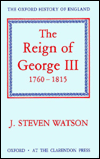

 |

|

The average rating for The Reign of George III, 1760-1815 based on 2 reviews is 4 stars.
Review # 1 was written on 2020-11-05 00:00:00 George Ohlin George OhlinA lot happened during Anne's 12 year reign. She presided over a nation emerging as a world power with a growing empire. The union of Scotland and England happened on her watch and with her encouragement. Anne was a semi-constitutional monarch. Her reign provides a fascinating insight into the workings of monarchy when the Crown was more than a cypher, though power was continuing to slip away from it. Any monarch worth their salt jealously guarded the royal prerogative; Anne was no exception. "All I desire is my liberty in encouraging and employing all those that Concur faithfully in my Service whether they are call'd Whigs or Torys, not to be tyed to one, nor to ye other, for if I should be soe unfortunat as to fall into ye hands of ether, I shall look upon myself tho I have the name of Queen, to be in realety but theire slave, which as it will be my personal ruin, soe it will be ye destroying of all Government, for instead of putting an end to faction, it will lay a lasting foundation for it..." "Why for God sake, must I who have no interest, no end, no thought but for ye good of my Country, be made soe miserable as to be brought into ye power of one sett of men, & why may I not be trusted, since I meane nothing but what is equally for ye good of all my subjects?" Although very different, personality wise, Anne seems to have taken Elizabeth I as her role model as Queen, even adopting her personal motto 'Semper Eadem' ("Ever the Same"/ "Always the Same"). Like the first Elizabeth she saw herself as a unifying figure, keen to govern independent ofpolitical faction. This was easier said than done; Anne's reign saw the growth of a party system - the Tories and the Whigs. A devout Anglican who took her title, 'Defender of the Faith', very seriously, she naturally inclined towards the Tories, and referred to them as "The Church Party". She would soon learn that this was a gross over-simplification. A fascinating period of British history, politically, socially and militarily, it is also one of the least straightforward. Under the Captain-General, Marlborough, The Grand Alliance ( which included Britain, The Netherlands and the Habsburg Empire) gained major victories over France and by 1711/12 France was on its knees. It was at this point that Anne's government under the chameleon like and ever slippery Lord Treasurer, Harley, secretly negotiated a peace treaty with the French; hence the coining of the term 'Perfidious Albion' by Britain's erstwhile allies. At the risk of gross over-simplification, the Whigs were for continuing the war, the Tories for peace and very lucrative trade deals. The latter won. Running alongside all of this was the question of the succession to the childless and ailing Queen's throne. Her half brother, the 'Pretender' was Roman Catholic and unless he adopted Anglicanism it was hard to see how he could succeed Anne. Her cousin Sophia, Electress of Hanover and/or her son George Lewis, the Elector, protestant to the core, were the obvious alternatives and the choice of the Whigs. Anne too, favoured a Hanoverian succession it seems, provided she could keep them out of her country until after her death. The Queen knew her history and understood why Elizabeth I had been so reluctant to name her successor. The last thing a Queen wants is a rival camp around which a political opposition can form. At the time of her birth, there seemed little likelihood of her coming to the throne. Her mother died when Anne was a child, also her grandmother and a much loved aunt. Her sister, the future Mary II, was married off young; Anne therefore grew up with no close female family members around her. Added to this, her father, the future James II, remarried; his new bride only a few years older than Anne and they were far from close. It was hardly surprising therefore, that Anne felt the need for close female contact - enter Sarah Jennings, the future Sarah Churchill, Duchess of Marlborough, otherwise known as Mrs Freeman. The Queen had lavished wealth and titles on the Marlboroughs for their services to her and the country. But Sarah was never likely to be satisfied and her behaviour became increasingly outrageous. How I longed for the Queen to pick up one of her walking sticks and strike down this obnoxious "over-mighty subject". But her style was more coldly regal than that. Magnificent! |
Review # 2 was written on 2012-02-01 00:00:00 Amy Jensen Amy JensenI don't like reviewing non-fiction books, since they are not my favorite to read in the first place. I turn to them when I want certain questions answered or confirmed and this book did that. It is very dry and text bookish, but I enjoyed the fact the author added the correspondences between Anne and Sarah Churchill. You can read between the lines and decide for yourself who controlled or loved who. 5 stars for information, but it wasn't hard to put down for me either. I believe if you enjoy nonfiction and want to read their letters for yourself, you will enjoy this. |
CAN'T FIND WHAT YOU'RE LOOKING FOR? CLICK HERE!!!